Events
Past Event
WED@NICO SEMINAR: Yingdan Lu, Northwestern School of Communication "The Evolution of Authoritarian Propaganda in the Digital Age"
Northwestern Institute on Complex Systems (NICO)
12:00 PM
//
Lower Level, Chambers Hall
Details
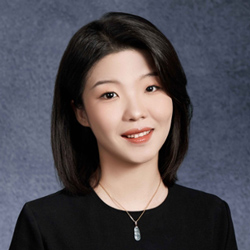
Speaker:
Yingdan Lu, Assistant Professor, Department of Communication Studies, Northwestern University
Title:
The Evolution of Authoritarian Propaganda in the Digital Age
Abstract:
How can authoritarian governments capture public attention in the digital era? This research talk explores the transformed landscape of information control in authoritarian regimes, which face the dual challenges of audience fragmentation across diverse media channels and heightened competition with non-governmental actors for public attention. In this talk, I will present two fundamental shifts that illustrate the evolution of authoritarian propaganda in the digital age. First, I theorize a decentralized model for producing and disseminating propaganda on social media and identify evidence of this model in China through a computational analysis of nearly five million videos from Douyin (Chinese TikTok). Second, I discuss how authoritarian regimes have been harnessing entertainment media platforms and influential actors to amplify the visibility of state-created content, with empirical evidence from China. Together, these studies contribute to our understanding of how digital technologies are changing not only the content of propaganda, but also the way in which propaganda materials are produced and disseminated.
Speaker Bio:
Yingdan Lu is an Assistant Professor in the Department of Communication Studies at Northwestern University, and co-director of the Computational Multimodal Communication Lab. Her research focuses on digital technology, political communication, and information manipulation. She uses computational and qualitative methods to understand the evolution and engagement of digital propaganda in authoritarian regimes and how individuals encounter and communicate multimodal (mis)information in AI-mediated environments. Her work has appeared in leading peer-reviewed journals across communication, political science, and human-computer interaction. Before joining Northwestern, Yingdan received her Ph.D. in Communication and a Ph.D. minor in Political Science from Stanford University.
Location:
In person: Chambers Hall, 600 Foster Street, Lower Level
Remote option: https://northwestern.zoom.us/j/92346340083
Passcode: NICO24
About the Speaker Series:
Wednesdays@NICO is a vibrant weekly seminar series focusing broadly on the topics of complex systems, data science and network science. It brings together attendees ranging from graduate students to senior faculty who span all of the schools across Northwestern, from applied math to sociology to biology and every discipline in-between. Please visit: https://bit.ly/WedatNICO for information on future speakers.
Time
Wednesday, November 6, 2024 at 12:00 PM - 1:00 PM
Location
Lower Level, Chambers Hall Map
Contact
Calendar
Northwestern Institute on Complex Systems (NICO)
"AI in Sports – From Discovery to Disruption" - Inderpal Bhandari
Northwestern Network for Collaborative Intelligence (NNCI)
12:00 PM
//
Guild Lounge, Scott Hall
Details
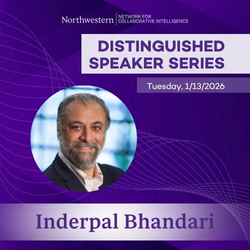
Join us for NNCI's first Distinguished Speaker event featuring Dr. Inderpal Bhandari, Creator of Advanced Scout (NBA), Former Global Chief Data Officer, IBM.
Title: "AI in Sports – From Discovery to Disruption"
Artificial Intelligence is transforming sports in ways that were hard to imagine just a few years ago. From how athletes train and perform to how fans engage and organizations operate, AI is playing a pivotal role in reshaping the entire ecosystem.
In this talk, I’ll share the evolution of AI in sports through a personal lens, beginning with my work on Advanced Scout for the NBA in the mid-1990s. At that time, long before terms like "data science" or "machine learning" were widely used, we built a system that helped uncover patterns in game data to support coaching decisions. It was an early example of what we now call augmented intelligence—technology supporting human expertise—and it laid the foundation for how data and AI are used in sports today.
I’ll then explore the current landscape, where AI is embedded (or is embeddable) in nearly every aspect of sports. From tracking player movement and preventing injuries to optimizing team strategy and enhancing the fan experience, the technology has matured significantly. We’ll look at how machine learning, computer vision, and even generative AI are being applied across different levels of sport—from professional leagues to college athletics.
Finally, I’ll discuss the future. As AI systems become more sophisticated, the emphasis will shift toward a greater collaboration between human and machine, not just in decision-making in the business of sports but in areas like coaching, recovery, personalized training, and the intangibles of motivation and the mental game. All done responsibly—ensuring transparency, fairness, and ethical use.
Lunch will be provided. Registration is required.
Dr. Inderpal Bhandari is a global leader in AI and data-driven transformation, with over two decades of experience across healthcare, technology, and energy. He currently serves on the Board of Directors of The AES Corporation, where he is on the Financial Audit and Innovation & Technology Committees, and previously served on the board of Walgreens Boots Alliance, where he sat on the Finance & Technology, Audit, and Nominating & Governance Committees.
As Global Chief Data Officer at IBM, Dr. Bhandari led the company’s enterprise data strategy and helped position IBM as a leader in AI and hybrid cloud. His career includes senior executive roles at Cambia Health Solutions, Express Scripts, and the development of Advanced Scout for the NBA—one of the earliest AI-driven tools in professional sports.
He holds a PhD in Computer Engineering from Carnegie Mellon University, where he also serves on the faculty, guiding executive education and mentoring the next generation of AI and data leaders.
Time
Tuesday, January 13, 2026 at 12:00 PM - 1:30 PM
Location
Guild Lounge, Scott Hall Map
Contact
Calendar
Northwestern Network for Collaborative Intelligence (NNCI)
"AI in the Judiciary" - U.S. District Court Judge Xavier Rodriguez
Northwestern Network for Collaborative Intelligence (NNCI)
12:15 PM
//
Thorne Auditorium, Arthur Rubloff Building
Details
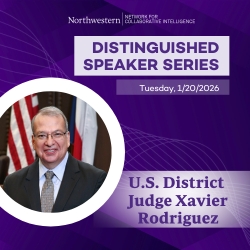
Join us for an in-person Distinguished Speaker event, co-hosted with the Law and Technology Initiative at Pritzker School of Law and McCormick School of Engineering, featuring U.S. District Court Judge Xavier Rodriguez.
Location: Thorne Auditorium, Pritzker School of Law, Chicago Campus
Lunch will be provided. Registration is required.
Time
Tuesday, January 20, 2026 at 12:15 PM - 1:30 PM
Location
Thorne Auditorium, Arthur Rubloff Building Map
Calendar
Northwestern Network for Collaborative Intelligence (NNCI)
"AI & The Future of News" - Featuring Emily Withrow, Larry Birnbaum, Nick Diakopoulos, & Jeremy Gilbert
Northwestern Network for Collaborative Intelligence (NNCI)
12:00 PM
//
Ruan Conference Room, Chambers Hall
Details
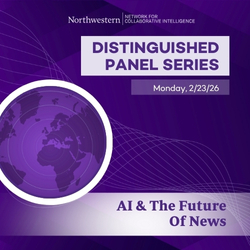
Join us for an in-person Distinguished Panel event featuring Emily Withrow (NY Times), Larry Birnbaum, and Nick Diakopoulos, moderated by Jeremy Gilbert.
Title: "AI & The Future of News"
AI is dramatically altering not only the way news is reported but also how audiences encounter and consume information. Journalists currently use AI for everything from analyzing imagery and generating graphics to proofreading articles, suggesting headlines, and monitoring their beat for new stories. As newsrooms adopt these tools to support content production and dissemination, they must also navigate ethical boundaries and responsible use. Meanwhile, malign actors are deploying deepfakes and generative models to spread disinformation and AI slop, increasing the verification workload on journalists. Join our Distinguished Panel to learn more about how AI is reshaping the future of news!
Lunch will be provided. Registration is required.
Time
Monday, February 2, 2026 at 12:00 PM - 1:30 PM
Location
Ruan Conference Room, Chambers Hall Map
Calendar
Northwestern Network for Collaborative Intelligence (NNCI)
"Generative AI for Molecules & Materials" - Featuring Julius Lucks, Chris Wolverton, Chris Schuh
Northwestern Network for Collaborative Intelligence (NNCI)
12:00 PM
//
Ruan Conference Room, Chambers Hall
Details
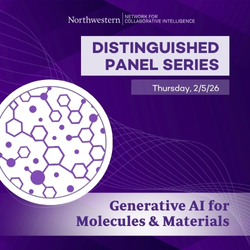
Join us for an in-person Distinguished Panel event featuring Julius Lucks, Chris Wolverton, moderated by Chris Schuh.
Title: "Generative AI for Molecules & Materials"
Since the award of the 2024 Nobel Prize in Chemistry, AI is no longer a theoretical tool. AlphaFold and its successors are now being used to rapidly identify disease targets, create novel molecules, and predict drug properties (like toxicity and effectiveness), significantly faster and cheaper than before. Likewise, Gnome and its successors are now reshaping the landscape of materials design, allowing designers to specify function first and then generate potential structures, dramatically speeding up discovery. Join our Distinguished Panel to learn how AI is reshaping the synthesis of materials, molecules, and drugs!
Lunch will be provided. Registration is required.
Time
Thursday, February 5, 2026 at 12:00 PM - 1:30 PM
Location
Ruan Conference Room, Chambers Hall Map
Calendar
Northwestern Network for Collaborative Intelligence (NNCI)
"Big-Data Algorithms That Are Not Machine Learning" - Jeffrey Ullman
Northwestern Network for Collaborative Intelligence (NNCI)
12:00 PM
//
3514, Mudd Hall ( formerly Seeley G. Mudd Library)
Details
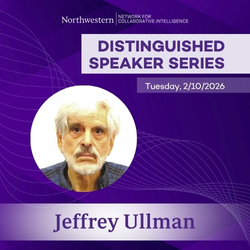
Join us for an in-person Distinguished Speaker event featuring Jeffrey Ullman, a prominent figure in computer science whose contributions have shaped the foundations of algorithms, databases, and theoretical computing.
Title: "Big-Data Algorithms That Are Not Machine Learning"
Abstract: We shall introduce four algorithms that run very fast on large amounts of data, although typically the answers they give are approximate rather than precise. (1) Locality-sensitive hashing (2) Approximate counting (3) Sampling (4) Counting triangles in graphs.
Lunch will be provided. Registration is required.
Jeff Ullman is the Stanford W. Ascherman Professor of Engineering (Emeritus) in the Department of Computer Science at Stanford and CEO of Gradiance Corp. He received the B.S. degree from Columbia University in 1963 and the PhD from Princeton in 1966. Prior to his appointment at Stanford in 1979, he was a member of the technical staff of Bell Laboratories from 1966-1969, and on the faculty of Princeton University between 1969 and 1979. From 1990-1994, he was chair of the Stanford Computer Science Department. Ullman was elected to the National Academy of Engineering in 1989, the American Academy of Arts and Sciences in 2012, the National Academy of Sciences in 2020, and has held Guggenheim and Einstein Fellowships. He has received the Sigmod Contributions Award (1996), the ACM Karl V. Karlstrom Outstanding Educator Award (1998), the Knuth Prize (2000), the Sigmod E. F. Codd Innovations award (2006), the IEEE von Neumann medal (2010), the NEC C&C Foundation Prize (2017), and the ACM A.M. Turing Award (2020). He is the author of 16 books, including books on database systems, data mining, compilers, automata theory, and algorithms.
Time
Tuesday, February 10, 2026 at 12:00 PM - 1:30 PM
Location
3514, Mudd Hall ( formerly Seeley G. Mudd Library) Map
Contact
Calendar
Northwestern Network for Collaborative Intelligence (NNCI)
"Fun with Fashion" - Larry Davis
Northwestern Network for Collaborative Intelligence (NNCI)
12:00 PM
//
Guild Lounge, Scott Hall
Details
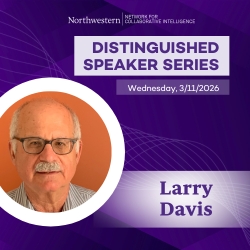
Join us for an in-person Distinguished Speaker event featuring Larry Davis, a leading figure in computer vision and artificial intelligence whose influential academic career and recent industry innovations at Amazon have helped shape modern approaches to visual understanding and generative media.
Title: "Fun with Fashion"
Abstract: More than 100,000,000 customers shop for clothing online at Amazon annually in the United States alone. The fashion catalogue is enormous and changes with high velocity as new styles are introduced and older items either go out of fashion or out of stock. Customers are challenged to find clothing that fits their style and their bodies at a price that fits their budgets. The Amazon Fashion science team addresses these challenges through the design and development of new machine learning and computer vision models that help customers navigate the catalog and efficiently evaluate items Amazon is recommending to them. The talk will discuss solutions the team has developed to problems including virtual try on (what will this garment look like on me?), complementary recommendations (how do I style this garment?) and size recommendations (what size, if any, of this garment will fit me?), emphasizing the challenges introduced by the need to have scalable solutions.
Lunch will be provided. Registration is required.
Larry Davis is a Senior Principal Scientist in Amazon’s Fashion and Fitness organization. He joined Amazon in 2018 after a long career in academics. At Amazon he worked on introducing novel customer experiences for fashion shopping like outfit builder (based on complementary recommendations) and virtual try on. He led Amazon’s first GenAI team for image and video synthesis, developing models to diversify the catalogue to make it more relatable for our customers. . He received his Ph. D. from the University of Maryland in 1975 and from 1977-1981 was an Assistant Professor of Computer Science at the University of Texas in Austin. He returned to the University of Maryland in 1981 and was the founding Director of the University’s Institute for Advanced Computer Studies (1985-1994). He also served as Chair of the Department of Computer Science from 2000-2012. Larry retired from the University in 2021 and is now a Professor Emeritus and a College Park Professor. He advised more than 75 Ph. D. students at Texas and Maryland. His work spanned many aspects of computer vision, including applications in visual navigation, robotic vision, media forensics, remote sensing,fashion and fundamental problems of object detection and activity recognition. He is a Fellow of both the IEEE and the ACM.
Time
Wednesday, March 11, 2026 at 12:00 PM - 1:30 PM
Location
Guild Lounge, Scott Hall Map
Calendar
Northwestern Network for Collaborative Intelligence (NNCI)
